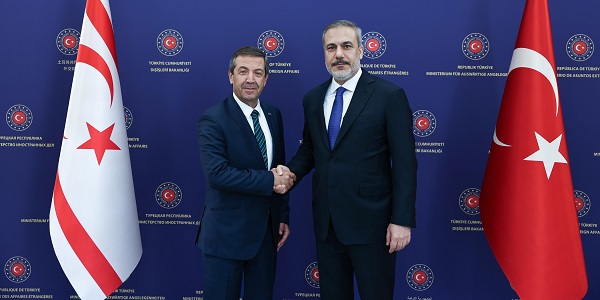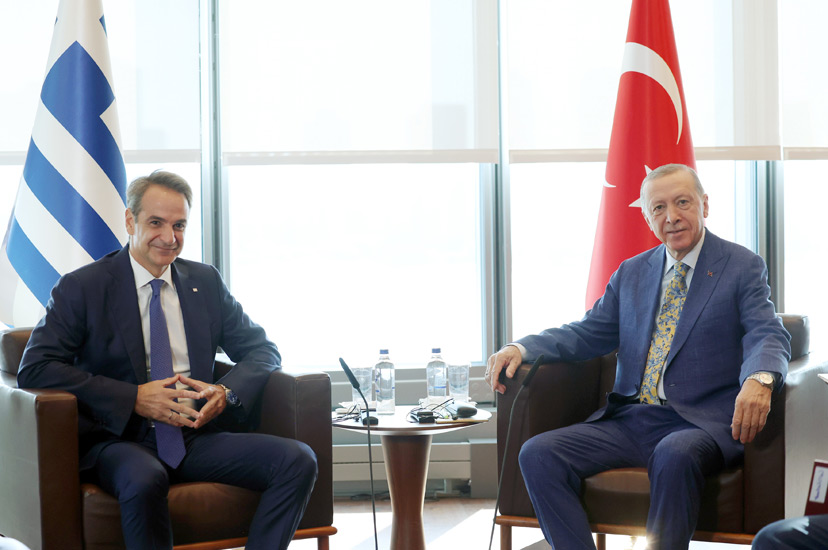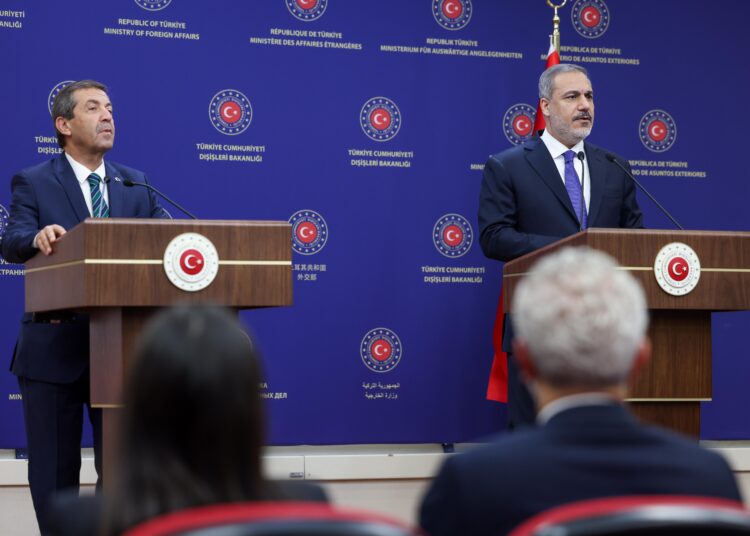Levent Kenez/Stockholm
Turkish Foreign Minister Hakan Fidan, in a press conference in Ankara on Wednesday after his meeting with Tahsin Türkoğlu, the foreign minister of the Turkish Republic of Northern Cyprus (KKTC), emphasized that Cyprus and the KKTC can benefit from the energy resources in the Eastern Mediterranean without waiting for a political solution to the long-standing Cyprus issue. The Cyprus issue has revolved around the political division of the island, with the KKTC declared by Turkish Cypriots in the north, which is recognized only by Turkey, and the Republic of Cyprus in the south, which is internationally recognized as the sole legitimate government of the whole island.
In addition, Minister Fidan expressed Ankara’s reservations about a Greek call for the resumption of Cyprus negotiations from where they left off in Switzerland’s Crans-Montana in 2017. The Crans-Montana talks aimed to find a political solution to the Cyprus issue but ended without a breakthrough, primarily due to disagreements on various key issues, including security arrangements and the presence of foreign troops on the island.

During the press conference, which led to the impression that the questions from reporters were known in advance, Fidan said waiting for a final solution on the island before benefiting from the energy resources in the eastern Mediterranean is not conducive to regional stability or global energy needs.
He noted that the KKTC had taken a constructive approach in July, proposing more creative approaches independent of a comprehensive political solution to the long-standing Cyprus issue. He claimed that the KKTC, despite the ongoing political division on the island, had put forward innovative ideas in July to address various issues, not necessarily tied to a final political settlement.
He also said there are specific areas where both communities can benefit. Foremost among them are hydrocarbon resources, followed by electricity integration, renewable energy, water, irregular migration and mine clearance. These are, in fact, matters of daily life that the communities eagerly await solutions for,” adding, “However, the Greek Cypriot side has been reluctant to cooperate in this regard. Turkey’s view aligns with that of the KKTC, asserting that it is possible to utilize the energy potential that both sides can equally benefit from without waiting for a political solution.”
Fidan pointed to the agreement signed in 2022 between Israel and Lebanon as an example, indicating that the Turkish and Greek parties could cooperate at this stage. Israel and Lebanon, historically in a state of conflict since Israel’s establishment in 1948, recently resolved a longstanding dispute regarding their Mediterranean Sea borders.
Hezbollah, a formidable militant and political organization in Lebanon, had previously threatened to take action against Israel if gas extraction were to occur before a mutual agreement was reached. Both countries, however, stand to reap substantial economic benefits from the gas field’s exploitation.
The agreement involves an area of approximately 330 square miles (860 square kilometers) off their respective coastlines. Until now, neither nation could tap into the natural resources in this region due to the ongoing boundary dispute. This contested territory includes a portion of Karish, an established gas field, and part of Qana, a potential gas reserve. In the agreement brokered with the assistance of the United States, Israel was granted full rights to Karish, while Lebanon’s rights to Qana were also officially acknowledged. Notably, Lebanon agreed to share some potential revenue from Qana, as a portion of the field extends into Israel’s territorial waters.
During the press conference Fidan and Türkoğlu also expressed reluctance to resume negotiations from where they left off, referencing the unsuccessful Crans-Montana talks in 2017, mainly due to the inability to reach an agreement regarding the presence of troops from guarantor states in Cyprus. Turkey advocates for the existence of two sovereign independent states in the Turkish and Greek Cypriot regions on the island, while the Greek Cypriots advocate for a federation model within a single independent state and call for the continuation of negotiations. The complexity of finding a political solution in Cyprus is obvious, with both sides holding differing positions.
During the United Nations General Assembly in New York in September, Turkish President Recep Tayyip Erdogan and Greek Prime Minister Kyriakos Mitsotakis held discussions, and a decision was made to increase dialogue. It was announced that President Erdogan would visit Thessaloniki in November. The Turkish side emphasized the importance of progress on issues related to energy pipelines in the eastern Mediterranean and the significance of both countries benefiting economically from these resources.

The European Union, engaged in discussions with Qatar and Azerbaijan, sees potential in the eastern Mediterranean’s oil and gas reserves as a possible alternative to Russian imports. Given the ongoing disputes with Greece causing tensions in the region, Turkey has been maintaining its drill ships in its territorial waters since 2020, aiming to ease the situation with the EU.
Meanwhile, Turkish Foreign Minister Fidan made a significant blunder during the meeting. He stated that the KKTC was established in 2004 after the United Nations Annan Plan referendum on the island, which was rejected by the Greek Cypriots. However, the island has been divided into a Turkish Cypriot north and a Greek Cypriot south since Turkey’s intervention in 1974 following a coup by Greek nationalists, with Turkish Cypriots declaring independence in 1983.












